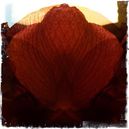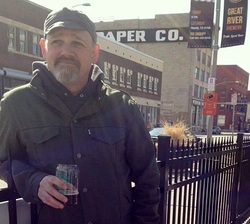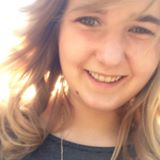ASSAY: A JOURNAL OF NONFICTION STUDIES
1.1
1.1
Kelly Daniels will be part of Concordia College's Visiting Writer's Festival,
October 1-3, 2014.
For More Information, click here.
October 1-3, 2014.
For More Information, click here.
|
As soon as I started Kelly Daniels' new memoir, Cloudbreak, California, the story of his adventurous youth, I was curious to talk with Daniels, both as a reader and a writer, especially as he will be visiting the college I attend this fall. The reader wanted to know how a young man who appeared to have no real sense of direction or purpose in life was able to achieve a doctoral degree, how he finally settled down. Daniels spent most of his childhood on the road, moving from Hawaii to California while he was living with his parents. After he moved out following his high school graduation, he continued to travel, throughout the United States, south to Central and South America. As a young adult with a similar case of wanderlust, I was curious as to how Daniels managed to satisfy that hunger for travel in a way that enabled him to eventually settle down. But the writer wanted to talk with him about the intricacies of the genre he'd chosen to write in, how he conceived of this book as a memoir, rather than what I might consider a collection of essays. Arguments about the lines between the subgenres of nonfiction are nothing new, but I wanted to know how he made the transition between fiction and nonfiction, as well as how he underwent the monumental task of choosing which stories to include in his memoir.
Our conversation took place via Skype on Monday, 13 July 2014 and he joined me from his living room in Rock Island. How did you get into writing? Well, I usually credit Dungeons and Dragons, believe it or not. I was into reading pretty young—my mom read to me pretty early. But I started just making up stories in my youth, like four or five years old. I spent a lot of time alone in this period of my life—I lived out in the desert in this place called Anza that I mentioned in the book. That was a formative place for me just because there were no other people around, no other kids. So basically, just the solitude made me rely upon my imagination to entertain myself. Also, it just seemed very magical to me, being away from people like that, especially since earlier in my life I lived on the coast in very populated beach towns. That always stuck with me. I never really thought of writing as a career, just because I didn’t know how to do it—and I still don’t---n a lot of ways. College, it was classes that I did well with. So you started by making up stories, and I know you write both fiction and nonfiction. How do you make the transition between the two? Well, I resisted writing nonfiction because fiction just seemed for artistic or creative in my mind. Some of the work in my graduate program, it seemed like the nonfiction people weren’t as competitive, just because it hadn’t caught on as much. The perception was that the nonfiction writers weren’t as good as the fiction and the poets. I don’t think that’s the case anymore, because I think that the secret’s out that this is a place with a lot of room. But, I kept writing these personal stories and fictionalizing them. I kept going back to this thing with my father and I kept creating characters like my younger self. It became so that it wasn’t material, it was really just a burden. It was stopping me from making other stories. Every now and then I would write an essay and every time I did that it seemed to do better than any of the fiction I did. And then I took a residency at an art colony-which I recommend to any young writer to look for these type of art colony residencies. So I decided to write my story and just tell it like it is. Your book is a memoir, but it looks like a book of essays, so how did you decide which memories to put in your book? That was the most challenging part of the book because I had a lot of material. The book was once twice as long as it is now and the criticism was that it didn’t all fit together. As someone in their mid-forties, I had to make my life a story. So I had to write down all of the good parts and figure out what the story or the plot was. After that I just eliminated everything that didn’t have to do with my father. Putting together the structure of it though was definitely just the nuts and bolts parts of things the rest of it was just sitting down and trying to make my experiences come to life. How much education do you think a person needs in order to be a successful writer? I think if you look at all the great writers--successful writers--throughout history there are a lot of dropouts. People were so smart, maybe too smart for school, and so they became story tellers. Story tellers have always been outcasts, since tribal societies and stuff like that. They are the ones who aren’t really fit for anything else. You absolutely do not have to have advanced degrees in order to become a writer. There’s no way. I think that increasingly it is a good way to go about it nowadays because the university system is almost the only patron of the art of literary writing nowadays. It almost impossible to make money writing in a literary way. You have to write what people want to read. If you do the literary thing, you still have to win awards and get publications, you have to do something to make yourself stand out. But your books don’t have to sell. If you look at poets, none of their books sell. But they’re distinguished by how famous their press is or what book award they win. Fiction and nonfiction are the same to some degree. Of course what everyone wants to do is to write a masterpiece that everyone wants to read, but of course not everyone can do that. So what I’m saying is that it’s hard to go and do the academic route for some reasons and it’s hard to do the nonacademic route for others. Basically, the best thing that you could do is what writers have been doing since there were writers is that people were super wealthy and they didn’t have to work. Then never tell anyone that. Pretend you’re a struggling artist but then secretly have a trust fund. If you dig into the background of lots of writers you may be surprised how many of them come from wealth. The need to work and feed yourself takes up a lot of energy, and sitting down and writing takes a lot of energy. So you need to find a way to make the equation work out. |
Click here to download a printable PDF.
|
Kelly Daniels earned his B.A. from San Francisco State, his M.F.A. from Georgia State, and his Ph.D. from Western Michigan. Currently he teaches at Augustana College in Rock Island, Illinois, where he lives with his wife and son. His fiction and nonfiction have appeared in many journals and his nonfiction recently won first prize at the San Miguel Writers' Conference.
|
|
Lauren Wilson is a sophomore at Concordia College where she is majoring in English Writing and Global Studies. Lauren is extremely passionate about travel writing and has published on the blog The Open Window Exchange. She is currently working on an essay about her experience hiking the West Highland Way in Scotland.
|


